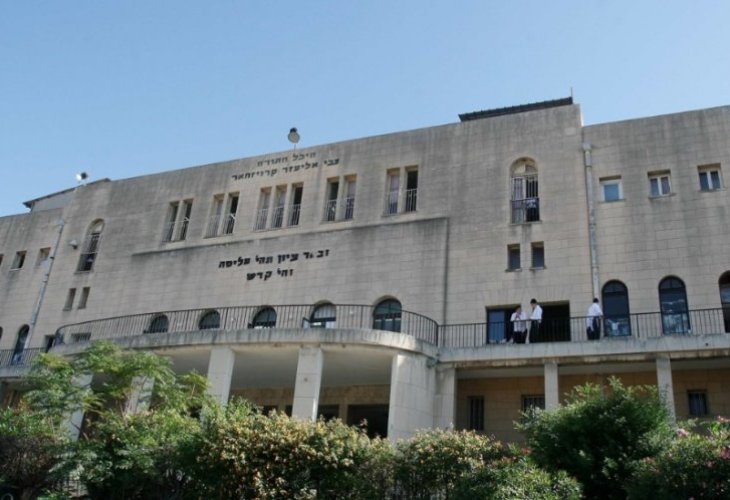Personal Stories
The Tears That Brought a Soul Back to Shabbat
How one man’s childhood memory and a rabbi’s tears led him to embrace Shabbat again after sixty years.

Rabbi Yitzchak Zilberstein, a member of the Council of Torah Sages and rabbi of the Ramat Elchanan neighborhood in Bnei Brak, once shared a powerful story that shows just how deeply the tears of a Torah leader can touch a Jewish soul even decades later.
He tells the story as he heard it from Rabbi Eliyahu Feivelson, head of Yeshivat Pitchei Olam, which helps Jews reconnect with Torah and mitzvot.
"One day," Rabbi Feivelson recalls, "a 70-year-old man knocked on my door. He introduced himself and said, ‘I’m a professor at one of Israel’s major universities. I recently retired and started keeping Shabbat. I came here because I want my wife to also come closer to Torah, and since you help people return to observance, I thought you could help.’"
Rabbi Feivelson was, of course, happy to try and help. But the whole situation left him curious. "I asked him, ‘If you’re here, it means you’re not already connected to a rabbi or community. So tell me, how does a 70-year-old professor, with no one reaching out to him, just suddenly start keeping Shabbat?’"
The professor smiled gently and said, “Let me tell you a story. Then you’ll understand everything.”
He began: “My parents survived the Holocaust. After the war, they married and settled in Ashdod. I had an observant uncle who advised my mother to send me to the orphanage in Bnei Brak run by Rabbi Yosef Shlomo Kahaneman, the great founder of the Ponevezh Yeshiva. My mother agreed and sent me there.
Back then, traveling from Ashdod to Bnei Brak wasn’t simple, so she never came to visit. But one day, she happened to be in the area and decided, ‘Since I’m here, I’ll stop in and see my son.’
As soon as she arrived and saw it was a religious place, she called me and said, ‘Pack your things. We’re going home.’ I was just nine years old. I packed and went home with her.
I don’t remember much from that time in my life but there’s one thing I’ve never been able to forget. And every time I think of it, I get emotional.
A few days after we returned home, someone knocked on our door. My mother opened it, and standing there was Rabbi Yosef Kahaneman himself. He said, ‘I run the orphanage in Bnei Brak. I came today and noticed your son was missing. I asked the staff, and they said his mother came and took him home.
So I got on a bus and came all the way to Ashdod to understand what happened. Was there something wrong? I’m willing to do whatever it takes to make things better for him.’
My mother answered, ‘No, nothing was wrong. But I lived through the Holocaust. I saw horrors I can’t even describe. I watched what the Nazis did to us. And I just don’t want my son to be religious.’
Rabbi Kahaneman stood quietly for a moment. Then he asked for a chair. He sat down in our house and cried. He didn’t yell, didn’t argue, he just cried.
He cried for ten full minutes. He cried for a Jewish child he felt he was losing. And then, he stood up, gave us a blessing, and left.
Now, almost sixty years later,” the professor told Rabbi Feivelson, “those tears won’t let me rest. Every time I remember them, my heart shakes. And that’s what brought me back. That’s why I started keeping Shabbat. And now I need your help to reach my wife too.”
Rabbi Feivelson said that he spoke to the professor’s wife, and thank G-d, she was moved by the sincerity and started growing as well. “Today,” Rabbi Feivelson shared, “he puts on tefillin every day. They keep Shabbat. They keep kosher. And they continue to grow closer to Hashem together.”
Rabbi Zilberstein added another layer to the story, suggesting that perhaps Rabbi Kahaneman learned this sensitivity from his own teacher, the great Chofetz Chaim.
He shared a story about a rabbi who had once been a student of the Chofetz Chaim and came to visit him from his town in Russia.
The Chofetz Chaim asked him, “What’s happening in your town?”
Understanding that the scholar wasn’t asking about physical matters, the rabbi began describing the spiritual struggles: “The barbers won’t close their shops for Shabbat. There are issues with family purity. Children are sent to secular schools, and no one listens to me.”
The Chofetz Chaim looked at him and said, “For Shabbat, you couldn’t do anything. For family purity, you couldn’t do anything. For education, you couldn’t do anything. But to faint, you could have! Why didn’t you faint?!”
When a Jewish soul is in danger, even if we can’t change everything, we can cry. We can care deeply. And sometimes like in the case of this professor, it’s those tears that awaken something inside, even after decades.
From “Vavei Ha’Amudim” – teachings and stories shared by Rabbi Yitzchak Zilberstein.

